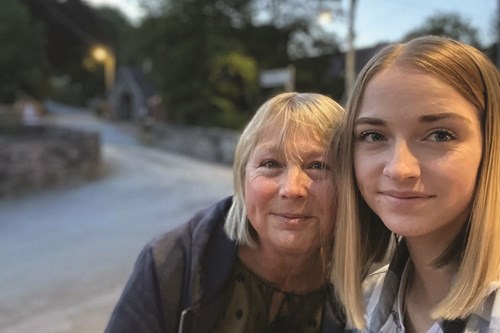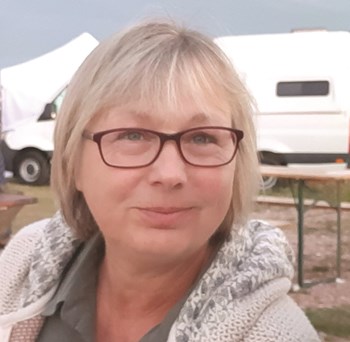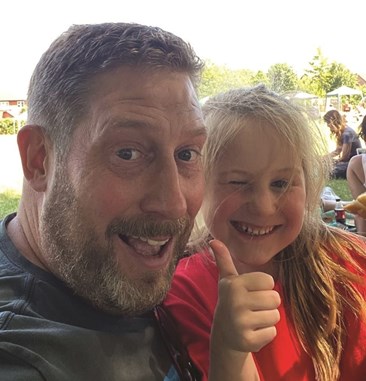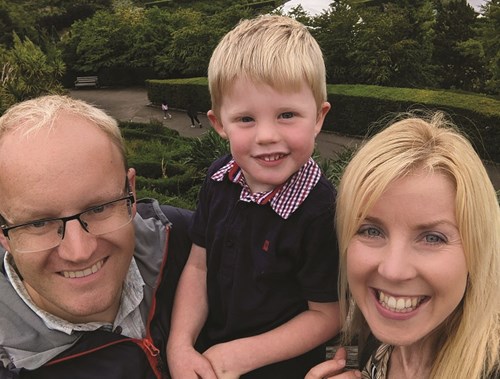How do I… help my deaf child to feel part of the deaf community?
For many deaf children, being part of the deaf community is a valuable way of learning more about deafness and developing a positive deaf identity. Here, one deaf young person and three parents share their tips on how to get involved.
Winter 2022 Families magazine

Molly (20) is profoundly deaf and uses British Sign Language (BSL).
Being part of the deaf community is like having a second family. We might have different experiences of deafness, but we all enjoy spending time together, having a laugh and sharing news. For example, during the Covid-19 pandemic, lots of important updates were in English so some deaf people missed out. The deaf community shared the information with each other in BSL to keep everyone safe. It’s also important for your mental health to feel part of a community.
When I was younger, I did lots of deaf sports like deaf football and deaf swimming. I went to a mainstream school, but I wasn’t happy there. I’m grateful to my parents for fighting for me to go to a deaf school instead. Thanks to them, I’m now at university and feel more involved in the deaf community. I’ve been to lots of deaf events, where I get to catch up with friends and meet new people. It’s really fun!
If your child wants to be involved in the deaf community, just go! You might have to travel a long way to a deaf event, but if you’re prepared to travel then enjoy the experience. As your child gets older, take your time working out what they need. Ask them if they want to wear their hearing technology; they have the right to decide. And don’t let your child think they can’t do something because they’re deaf. Deaf people can do anything!

Beth is mum to Molly (above) and William (23) who are both profoundly deaf and use BSL.
Although integration into mainstream education is a good idea, it’s not always the best option for profoundly deaf BSL users like Molly. We live in a rural area without a local deaf community. The National Deaf Children’s Society and our county’s sensory impairment inclusion manager told us about opportunities and events for deaf children. We took Molly and her brother to deaf football sessions at Cardiff City Football Club. They also went to a deaf camp in Northern Ireland, which provided opportunities to meet other deaf children.
When Molly moved to a deaf school, she learned about deaf history and deaf culture and was introduced to deaf role models. She started to feel part of the deaf community, which has had a positive impact on Molly’s development, helping her to overcome obstacles.
When Molly’s around her deaf peers, she’s more relaxed, independent and engaged, and more likely to step out of her comfort zone. Around hearing peers, Molly is often introverted and less likely to participate.
For hearing parents of deaf children, taking the first steps to engage with the deaf community can be difficult but it’s always worth it.

Henry is dad to Beatrix (5) who is profoundly deaf.
We’re fortunate to be part of a large Deaf family. All our children use English and BSL. We actively seek out deaf peers for Beatrix, sometimes travelling long distances to attend national deaf events. Beatrix communicates easily with her deaf peers; they laugh, challenge each other cognitively and enjoy fast-moving, two-way conversations, which is normal for children conversing. With hearing peers from school, Beatrix struggles to fit in as she misses out on incidental listening and gossip. She tends to play alongside them, rather than with them.
I believe that all deaf children should be exposed to the Deaf community. We know of deaf adults who were deprived of this opportunity and now look back on their childhoods with regret. Often, it’s because their parents weren’t aware of the Deaf community or were reluctant to become involved. This impacts the deaf adult’s self-esteem. Meeting other deaf children and having the same shared experiences can do wonders for a child’s Deaf identity and sense of self-worth.
The Deaf world may seem a frightening place, but don’t be scared! Keep an open mind and find out as much as you can. Your options will vary depending on where you live. Check out your local Deaf Children’s Society, join Facebook groups and go to events designed for deaf children, such as Deaf theatre and Deaf sports. It’s an opportunity to embrace new things!

Julie is mum to Joshua (4) who is moderately to severely deaf and has CHARGE syndrome.
When we learned Joshua was deaf, I started learning BSL at Swansea Centre for Deaf People. It was life changing. As well as learning BSL, I learned about Deaf culture and history. It’s an ongoing, fascinating journey. We feel fortunate to have met many inspiring people along the way who are passionate about achieving equality for deaf people, who we’d never have met if Joshua wasn’t deaf.
If you want to get involved in the Deaf community, don’t be intimidated. I’ve found the Deaf community has a strong identity but is very welcoming. Get involved with your local deaf club, go to deaf events and watch TV programmes like ‘See Hear’ to learn about Deaf culture.
If there aren’t any deaf clubs in your area, ask your audiologist or Teacher of the Deaf to connect you with other families of deaf children. Try going to deaf events with another parent of a deaf child. Joshua has additional needs and isn’t yet speaking or signing, so in conversations with parents of hearing children, I often feel I’m living in a different world to them. Finding a community of like-minded people who can empathise and share stories and advice is massive.
